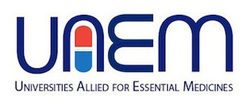Universities Allied for Essential Medicines (UAEM), CWRU Chapter
Who is UAEM?
UAEM is uniquely positioned and committed to advocating for the integrity of universities’ public-service mandates and the prioritization of global public health benefits in academic medical research. We work to promote open-source, accessible, and affordable innovation mechanisms at every stage of the university medical R&D process, including at the traditional pressure point of licensing.
While the core focus of work takes place at universities, students take part in and promote an ethical R&D system maximizing their potential to address the political economy of global health. In light of this, we will strive to further increase our voice and impact by simultaneously consolidating our specific niche and reaching out to foster broader strategic partnerships that advance the field of access and innovation.
Our three main pillars: Access, Innovation, and Empowerment.
Access Initiative: Medicines and health technologies, particularly those developed at universities or with public funding, are made accessible and affordable to people in resource-limited settings through open access and open source IP mechanisms–reflecting public health benefit and equity as the primary aims of academic and public medical research.
Innovation Initiative: Dramatically increase publicly funded biomedical R&D for the global health needs of neglected populations, especially through the use of sustainable funding mechanisms, and innovative open-knowledge approaches to research.
Empowerment Initiative: UAEM students are empowered to stand at the vanguard of leadership in global health access and innovation, making substantial change at academic institutions, and pursuing vocations and careers that advance health for all.
Today, with over 100 chapters in more than 20 countries across the world, UAEM students work to influence policies at universities in order to ensure that products of biomedical research and development are made available to and affordable to the people who need them most. Historically this has been the poor and most marginalized communities worldwide.
Our main website is uaem.org
For more information on the UAEM CWRU Chapter, please email Neha Sharma ([email protected]) or Dhiksha Balaji ([email protected]).
While the core focus of work takes place at universities, students take part in and promote an ethical R&D system maximizing their potential to address the political economy of global health. In light of this, we will strive to further increase our voice and impact by simultaneously consolidating our specific niche and reaching out to foster broader strategic partnerships that advance the field of access and innovation.
Our three main pillars: Access, Innovation, and Empowerment.
Access Initiative: Medicines and health technologies, particularly those developed at universities or with public funding, are made accessible and affordable to people in resource-limited settings through open access and open source IP mechanisms–reflecting public health benefit and equity as the primary aims of academic and public medical research.
Innovation Initiative: Dramatically increase publicly funded biomedical R&D for the global health needs of neglected populations, especially through the use of sustainable funding mechanisms, and innovative open-knowledge approaches to research.
Empowerment Initiative: UAEM students are empowered to stand at the vanguard of leadership in global health access and innovation, making substantial change at academic institutions, and pursuing vocations and careers that advance health for all.
Today, with over 100 chapters in more than 20 countries across the world, UAEM students work to influence policies at universities in order to ensure that products of biomedical research and development are made available to and affordable to the people who need them most. Historically this has been the poor and most marginalized communities worldwide.
Our main website is uaem.org
For more information on the UAEM CWRU Chapter, please email Neha Sharma ([email protected]) or Dhiksha Balaji ([email protected]).
Our Issues

Ten million people die each year from diseases that have available cures. Tragically, the essential medicines to treat such diseases are lacking throughout much of the world. Nearly a third of humanity does not have regular access to essential medicines, and in the poorest parts of Africa and Asia this figure rises to over 50%. During the fifteen seconds it takes to read this paragraph, five people have died from preventable causes.
Many diseases affecting millions of the world’s poorest remain entirely overlooked. Countless people suffer in developing countries from sleeping sickness, lymphatic filariasis, blinding trachoma, and other “neglected diseases,” because these destitute sick do not constitute a sufficient market opportunity to attract commercial research and development. In fact, only 10% of research and development (R&D) dollars go towards research into 90% of the world’s health problems.
The health burden facing millions in the developing world is of the most pressing moral issues of our time, yet also one of the most solvable. In this environment, universities have a critical role to play. Many of our most important medicines were invented at universities; their accessibility around the world depends critically on how universities manage their intellectual property. As research institutions that exist to serve the public good, universities are natural leaders in the search for new treatments for neglected diseases.
Many diseases affecting millions of the world’s poorest remain entirely overlooked. Countless people suffer in developing countries from sleeping sickness, lymphatic filariasis, blinding trachoma, and other “neglected diseases,” because these destitute sick do not constitute a sufficient market opportunity to attract commercial research and development. In fact, only 10% of research and development (R&D) dollars go towards research into 90% of the world’s health problems.
The health burden facing millions in the developing world is of the most pressing moral issues of our time, yet also one of the most solvable. In this environment, universities have a critical role to play. Many of our most important medicines were invented at universities; their accessibility around the world depends critically on how universities manage their intellectual property. As research institutions that exist to serve the public good, universities are natural leaders in the search for new treatments for neglected diseases.

